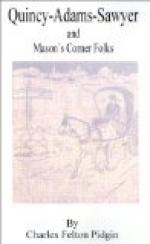The duet was beautifully sung. Quincy had a fine well-trained tenor voice, while Miss Putnam’s mezzo-soprano was full and melodious and her rendition fully as artistic as that of her companion. One, two, three, four, five, six encores followed each other in quick succession, in spite of Professor Strout’s endeavors to quell the applause and take up the next number. The ovation given earlier in the evening to Professor Strout was weak in comparison with that vouchsafed to Quincy and Lindy when they took their seats. In vain did the Professor strive to make himself heard. Audience and chorus seemed to be of one mind. The Professor, his face as red as a beet, turned to Ezekiel Pettengill and said:
“That was a mighty impudent piece of business, don’t you think so?”
“They’re both mighty fine singers,” Ezekiel responded in a rather unsympathetic tone.
Quincy realized that something must be done to satisfy the demands of the now thoroughly excited audience. Going to Miss James, he asked her a question in a low voice, in reply to which she nodded affirmatively. He next sought Miss Putnam and evidently asked her the same question, receiving a similar answer. Then he led her forward, and she sang the opening part of “Listen to the Mocking Bird.” After they had sung the chorus it was repeated on the piano and Quincy electrified the audience by whistling it, introducing all the trills, staccatos, and roulades that he had heard so many times come from under Billy Morris’s big mustache at the little Opera House on Washington Street, opposite Milk, run by the Morris Brothers, Johnny Pell, and Mr. Trowbridge, and when he finished there flashed through his mind a pleasant memory of Dr. Ordway and his Aeolians. An encore was responded to, but the tumult still continued. Turning to Ezekiel, Strout said:
“Ain’t it a cussed shame to spoil a first-class concert this way?”
“He’s a mighty fine whistler,” replied Ezekiel in the same tone that he had used before.
Finally to quiet their exuberance Quincy was obliged to say a few words, which were evidently what the audience was waiting for.
“Ladies and gentlemen,” he said, “the hour is getting late and there is another number on the programme. Miss Putnam is tired and I shall have to wet my whistle before I can use it again. I thank you for your kind indulgence and applause.”
This little speech pleased the audience. It was down to their level, with “no sign of stuckupativeness about it,” as one country girl remarked to her chum. Quincy bowed, the audience laughed, and quiet was restored.




